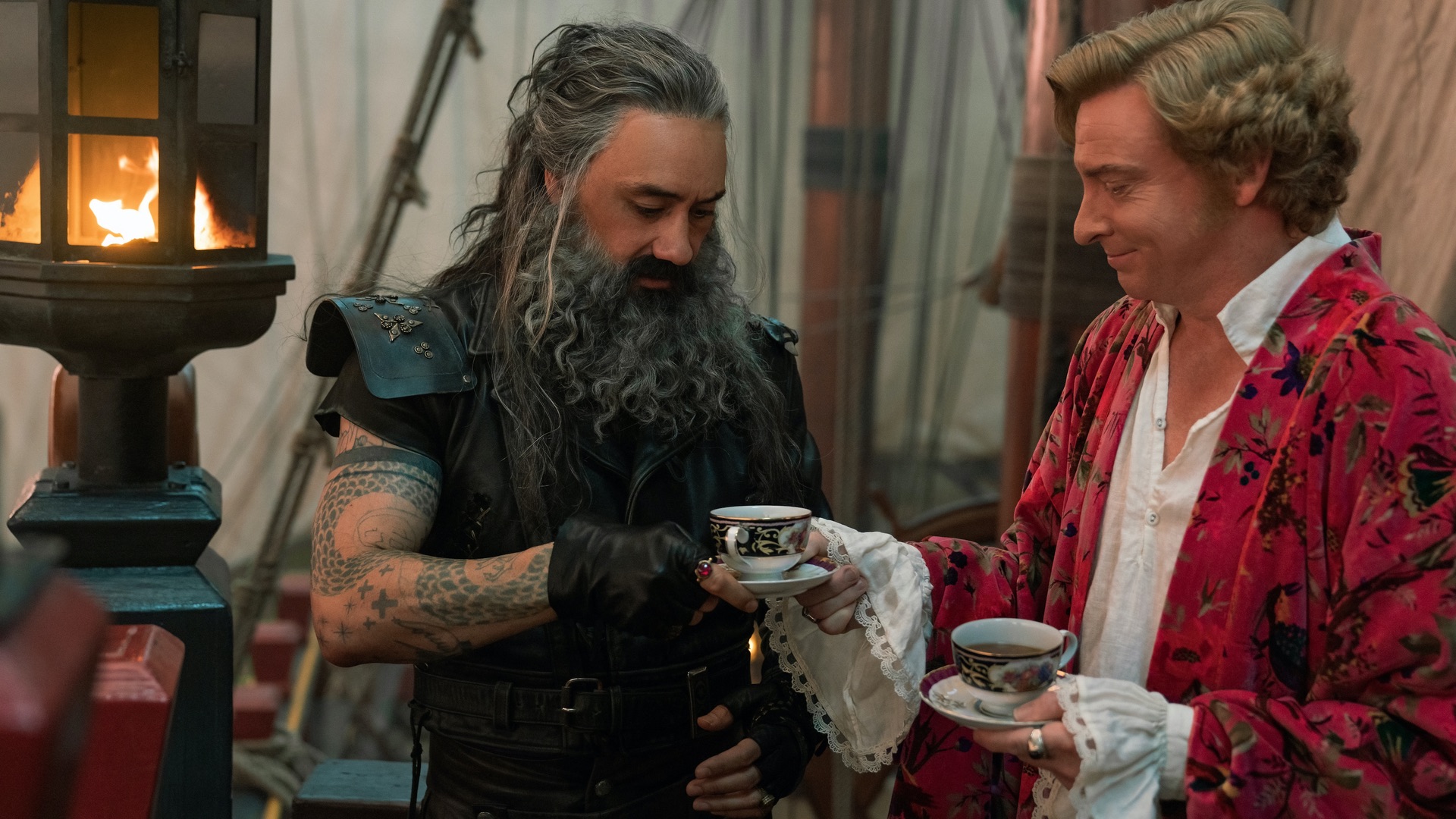When I first watched Our Flag Means Death, its components felt immediately familiar, even though I had never experienced all of the pieces together in one show before: murderous pirates, comedic violence and sappy romance. When I found a comment on Twitter saying that the show felt like fanfiction, everything immediately fell into place.
In retrospect, even the set-up of the show sounds like fanfiction: OFMD is a quasi-historical rom-com that follows Stede Bonnet (Rhys Darby), an aristocrat-turned-pirate who believes he can usher in a new age of piracy, one where pirates aren’t merciless killing machines, and are, instead, aware of things such as retirement. Unluckily, he soon meets Blackbeard (yes, that Blackbeard), played by Taika Waititi, who is thinking of leaving piracy. Despite the latter’s cruel reputation, the two hit it off immediately as friends, and then something more.
The show mirrors many alternate-universe fics, where characters from a fictional universe are placed in a different setting. For example, a much-loved ship seen in a fantasy setting, like Game of Thrones’ Jaime and Brienne, could be placed in a world that vaguely resembles Star Trek, or in current times. By placing the characters in a different universe, certain traits of characters get expressed more strongly, or in different ways; in OFMD, the background of piracy heightens Blackbeard’s lack of self-awareness, along with Stede’s kindness.
Our Flag Means Death has been shooting up the viewership charts. According to Parrot Analytics, Our Flag Means Death was the number-one most in-demand show on HBO or HBO Max at the end of March. Fans on social media have been going wild over the show with fan art, memes and demands to renew it for a second season.
The show has been especially popular with queer fans who have commented on how the show has given them the representation they want, and feels like it was written about minorities to minorities.
OFMD follows the tradition of fanfiction by creating satisfying payoffs for queer characters in scenarios written by members of marginalized groups. The feeling of fanfiction is created through the show’s refusal to queerbait (where creators hint at queer relationships, rather than actually showing them), its use of popular fanfiction tropes like role reversal and mutual pining, and the intense focus on romance.
Before we go on, a brief summary of fanfiction
Fanfiction is fiction-writing based on an existing work of media—whether that be a movie or a television series like OFMD. The ties between fanfiction and rom-coms like OFMD are intimate; the majority of fanfiction is based on a “ship” or pairing of characters, particularly ones who don’t have any fulfilling romantic resolution in the original show, movie, series or text. Key queer examples are “Destiel” (Dean Winchester and Castiel on Supernatural) and “Johnlock” (John and Sherlock in BBC’s Sherlock). These aren’t the only queer examples, either—fanfic often pairs up canonically straight characters, particularly straight men, in same-sex relationships. In contrast to many endings of the original media, fanfiction’s tone is often light and escapist.
On websites where fanfiction is found, like Archive of Our Own, fics are often described through their use of “tropes,” setting and length. Tropes can fall under broader, structural elements (slow burn, enemies to lovers, or the strangely popular coffee shop alternate universe), or shorter one-off happenings (role reversal, pining and hurt/comfort). As for length, fics can have any word count, from only being 50 words, to being over 3.5 million words. Fics that fall under 1,000 words are known as a drabble, while those longer and unchaptered are called a one-shot. Fics longer than one-shots and are chaptered like novels are called long-fics.
All roads lead to love
Like fanfic, OFMD reverses television’s tendency to queerbait by instead putting the main pairing of Stede and Blackbeard front and centre. David Jenkins, the show’s creator, says that the main goal was to turn the idea of a “bromance” into an actual romance.
By following the structure of a rom-com, OFMD adopts the same journey as fanfiction, especially longer-form fanfiction. Instead of fans having to write about what didn’t happen in the canon, they can sit back and watch the journey of the relationship between Stede and Blackbeard with actual payoff.
In that journey, OFMD uses many of the same tropes as fanfiction. In the early episodes, there’s a general lack of quest. Instead of focusing on a larger plot, the show focuses on what silly adventures Stede and Blackbeard will get into, almost like a series of one-shots that make the two go through popular fanfic tropes. In one episode, Stede and Blackbeard swap identities (role reversal, in fandom terms) and in doing so discover that they work well together; in another, Stede pines after Blackbeard (mutual pining), and keeps an eye on him with a telescope. The cherry on top is at the end of the season, where Stede finally realizes that he’s in love with Blackbeard, known as the “oh” moment. OFMD shows that the tropes fanfiction writers have popularized for years aren’t just a hit for their niche audiences; they can also be used to great effect for wider audiences.
Another element that makes the show feel like fanfiction is the show’s focus on appearing convincing, rather than correct. One prime example of this is when Blackbeard and Stede are talking about Blackbeard hypothetically opening a restaurant called Blackbeard’s Bar and Grill and Other Delicacies … and Delights and Fishing Equipment:
The show doesn’t take historical accuracy all that seriously. This can be seen in the set and costuming (the terrifying Blackbeard is wearing a purple T-shirt), but it’s also used in the way the characters talk and relate to one another. In the clip above, Stede mentions that Blackbeard should add a gift shop to his restaurant, which certainly wasn’t a thing in 1717. The light and silly tone of the show stops the audience from questioning this fully— it’s just convincing enough for the two to build a conversation on, which is really the meat of the scene.
Rather than treating historical accuracy as something the show must follow, the show instead uses it as a springboard on which to build romance. This follows the approach of many fanfiction writers. While they may research and fit in historical details as much as they desire, they often adjust details to create events for the pairing that both heighten their romance and convince the audience to root for them. In both the show and fanfiction, romance is second to nothing else, and it suffuses everything.
Fanfiction vs. bigots
For marginalized groups, fanfiction brings an opportunity to rework works into something that better fits their experiences. One example of this is with J.K. Rowling and the Harry Potter series.
In the wake of Rowling’s transphobia, some diehard fans have cut off all relations to anything related to Harry Potter. Numerous articles have been written on how it’s impossible to support any content within the HP universe without supporting Rowling. However, fanfiction offers a way to do so. Plumbella, a Sims YouTuber who previously made many videos featuring Harry Potter content, does exactly this. While she is still interested in the world of Harry Potter, she does not look at any official content Rowling has made—instead, she reads fanfiction to connect to her interests.
Some of the fanfiction within the Harry Potter fandom has also taken a stand against Rowling, either explicitly or implicitly. All The Young Dudes, a popular fanfiction featuring Sirius and Remus on Archive of our Own, has over 6.5 million hits, and in the story’s summary, the author says that they do not support Rowling’s views. Others subvert the characters to work against Rowling’s agenda by showing trans characters within her stories who aren’t the murderous carciatures that she creates in her writing.
This constant working-in of queerness within fic, along with its explicit stands against bigotry, has built the idea that fanfiction is a safe space for marginalized people. OFMD fosters this same sense of safety in the show with its openly queer cast and characters. Besides Stede and Blackbeard’s romance, the show taps into queer reinventions of tropes, especially through Jim, played by non-binary actor Vico Ortiz. There are many characters who have crossdressed—pretentious Shakespeare scholars will make comparisons to Viola, Rosalind, and Portia—but it’s rare for a character to come out of crossdressing with a better understanding of their gender and how they want to present themselves.
The wonderful and chaotic character of Jim is an example of how tropes can be adjusted to better fit queer experiences, as they begin the show crossdressing as a man before they are discovered by Lucius. When they come out, it’s delightfully simple: Jim tells the crew that they wish to be seen and treated as the same before they were outed, and they simply listen. Even the big villain respects Jim’s pronouns.
This lack of recourse makes OFMD a great escapist show, even when it tackles complex topics.
Not just gay—also good
When I see people fawning over the next hit of queer media, part of me assumes that it’s just because people are so starved for any representation.
But under all OFMD’s comedy, it’s clear that the writers have thought deeply about the characters and their arcs.
Considering all the show pulls from fanfiction, it’s not a surprise that there’s already a wealth of fanfiction for the show, especially around Blackbeard and Stede. Black Sails, a period drama from 2017, pioneered gay pirates on television, but Our Flag Means Death is a lighter version for lovers of rom-coms like Pride and Prejudice. While some may lament that the genre of rom-coms are fading with movies like The Kissing Booth and Tall Girl, Our Flag Means Death connects to fanfic to show how the genre can be revitalized.
And finally, to the Tumblr fangirls in 2015 who worshipped the gay pairings of Destiel and Johnlock, I have good news: the new (and actually queer) era of “Superwholock” is upon us.


 Why you can trust Xtra
Why you can trust Xtra


